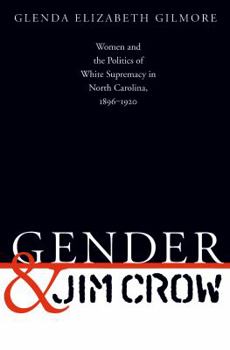Gender and Jim Crow: Women and the Politics of White Supremacy in North Carolina, 1896-1920
Select Format
Select Condition 
Book Overview
This classic work helps recover the central role of black women in the political history of the Jim Crow era. Glenda Elizabeth Gilmore explores the pivotal and interconnected roles played by gender... This description may be from another edition of this product.
Format:Paperback
Language:English
ISBN:0807845965
ISBN13:9780807845967
Release Date:September 1996
Publisher:University of North Carolina Press
Length:410 Pages
Weight:1.45 lbs.
Dimensions:1.1" x 6.1" x 9.2"
Customer Reviews
5 ratings
Wonderful New Insights
Published by Thriftbooks.com User , 14 years ago
I loved this book. I recently read it to for a paper I was writing on woman's suffrage, and was initially concerned the focus on North Carolina would be too narrow to serve my purposes. However, Gilmore's research and analysis of the role played by black middle class women after Reconstruction and the multi-layered conflicts in southern society around enfranchisement, economic security and cultural and masculine identity is eye-opening. Gilmore's exposure and explanation of the invidious 'propaganda wars' conducted by white supremacists do much to explain regional antipathy to equal rights for both African Americans and women. P. Abeles
Political and Economic Shaping of Gender
Published by Thriftbooks.com User , 19 years ago
The influence of sex on gender is often mistakenly emphasized to the extent where sex and gender are seen as synonyms. Historian Glenda Gilmore challenges this aberration by re-examining the formative years of Jim Crow in North Carolina through the lens of middle-class African American Women. Her reconstruction of this assumed history demonstrates acute gender construction divergences based on race, class, and political circumstance. Gilmore discloses the dynamics of marriage, education, and above all hope in shaping the differences between gender construction between African Americans and whites. The racial progressive momentum of Reconstruction shaped educated African American women to uplift their race in an effort to improve living standards for their families, to open up opportunities for their sex for both races, and to change white attitudes toward African Americans. By accenting the life of Sarah Dudley Petty, Gilmore reveals that her activism as a "feminist" and as an African American was in contrast to white women because black women were responding not just to patriarchy but to racial oppression as well. A famous example of how African American women hoped to uplift their race was through their work in the Women's Christian Temperance Union (WCTU). This organization provided North Carolina's black women "their best hope for building strong communities and securing interracial cooperation" (32). The WCTU became a point of mutually for both whites and blacks to improve community and gender equality. When black men voted, white women welcomed and sought out the activism of black women. Political circumstance for both groups of women afforded a glimmer of hope that racial equality was possible, however, as the political circumstance changed under the swagger of Jim Crow, white WCTU members got behind white supremacist leaders. Gilmore explains the gender construction of whites was molded by the downturn of the economy. As hard times hit the North Carolina agrarian economy, a reconsideration of racial parity was in quick demand and an explicit white supremacy movement formed to deny blacks all their gains from Reconstruction. The "New White Men" sought to reconstruct racial interaction, and in particular sexual interaction between the "races." Gilmore reveals that the White New Man effectively created a social norm where it was no longer a demonstration of strength to have sex with a black woman but a sign of weakness. New White Men now expected white women, across class boundaries, to be wholesome and chaste in order to maintain racial purity. In turn, white women began to hold the White New Men culpable for the previous generation that allowed for racial miscegenation transgressions. Such feminine pressure as expressed by the Waddell women, Gilmore argues, supplied the once ineffectual Alfred Waddell to lead the Wilmington slaughter and take the office of mayor of Wilmington. In the dismal days after the suc
Original, important, a tad romantic
Published by Thriftbooks.com User , 24 years ago
Gilmore breaks new ground on many fronts that will interest social historians of race and political historians. She uncovers the myriad arenas in which black women and white women pursued "politics" outside the formal arenas of electoral institutions. She also reveals the surprising coalitions formed across racial lines and the mindset of an upper-South State on the eve of disenfranchisement. Gilmore's writing flows smoothly, as other reviewers have noted, but at times becomes overwrought and sentimentalized in a way that makes it sometimes tedious and sometimes aggravating to stay with the text. She's become captured a bit by her characters and sources. But this is a small criticism in the context of an overwise pathbreaking study that's well worth the read.
Best of Genre
Published by Thriftbooks.com User , 25 years ago
This book is a mind-blower. It reveals the history of white supremacy as an overt political campaign in the South in the early 20th century, and more importantly the roles that middle-class black women self-consciously assumed in this very dangerous cultural arena. Historins talks a lot about ideology and race and agency, but this is the most skillful and convincing account that I've read: by examining how people - men, women, poor, rich, black, white - understood and tried to shape their worlds, Gilmore recasts a significant portion of American history, and made me re-examine my assumptions about racism and gender and politics. I'm working towards my graduate degree in history, so I've had to read scores of books that cover similar ground - and this is the by far the best treatment that I've read. Also very important: Gilmore is an excellent writer - this text reads as smoothly and as compellingly as a novel. Can't recommend it highly enough.
This book is sheer genius
Published by Thriftbooks.com User , 27 years ago
This book is sheer genius




